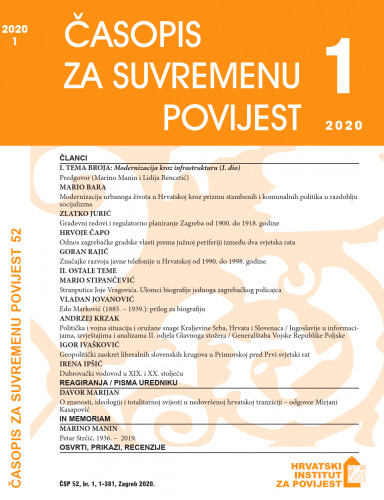U radu se na temelju arhivske građe, tiska, historiografske i memoarske literature rekonstruiraju biografski detalji iz života Ede Markovića, agronoma, bankara, javnoga radnika, člana Narodnoga vijeća Slovenaca, Hrvata i Srba te rotarijanskoga aktivista i generalnoga direktora državnoga monopolskog poduzeća za otkup i izvoz poljoprivrednih proizvoda. Posebna pozornost posvećena je „beogradskoj fazi” njegova života, profesionalnom angažmanu, međunarodnim aktivnostima i mjestu u poslovnim i političkim krugovima Kraljevine Jugoslavije te mogućim motivima njegova ubojstva, koje je počinila jugoslavenska policija 1939., a u tadašnjoj javnosti predstavljeno je kao „nesretan slučaj”.; Using archival data, press articles, and historiographical and memoir literature, this paper reconstructs biographical details from the life of Edo Marković, agronomist, civil servant, member of the National Council of Slovenes, Croats, and Serbs, Rotary Club activist, and general manager of the state monopoly company for the purchase and export of agricultural produce. The life philosophy of Edo Marković, which could be described in brief as opposition to inertia and authority, led him from his early childhood into temptations, which he overcame by following his intuition. They included identity dilemmas, education, political experimentation, and a principled determination to ‘serve the homeland, not the government’. Thanks to the organisational skills he displayed during World War I, his later banking career, the international reputation he enjoyed in the highest Freemason and Rotary circles, the crown of which was his position in the League of Nations, he acted more like an expert than a politician. Even though he was a member of several political organisations, he continued to adhere to the ideology of his old company, grown from the Croatian-Serbian Coalition. His Rotary enthusiasm outweighed the dashed hopes about the future of the Yugoslav state, and contributed to a sort of internal escapism and turn towards international activism. The affinity of Marković’s children for left-wing ideas, despite their material status, was certainly fostered by the opinions of their father, who afforded them a comprehensive education, thus allowing them to independently form their views on how the Russian Revolution went astray, the consequences of the Nazi rise to power, and the characteristics of Anglo-Saxon civilisation.
Sažetak

 Časopis za suvremenu povijest : 52,1(2020) / glavni i odgovorni urednik, editor-in-chief Zdravka Jelaska Marijan.
Časopis za suvremenu povijest : 52,1(2020) / glavni i odgovorni urednik, editor-in-chief Zdravka Jelaska Marijan.